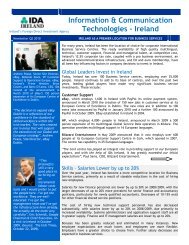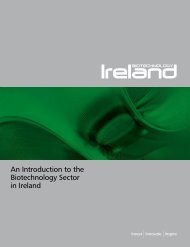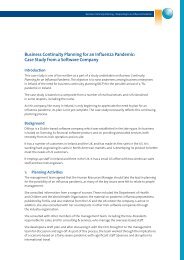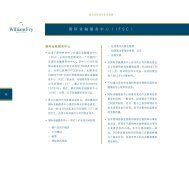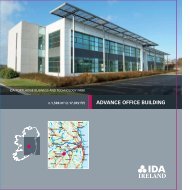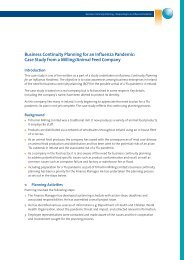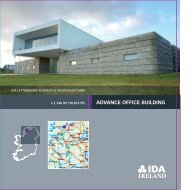Creativity - IDA Ireland
Creativity - IDA Ireland
Creativity - IDA Ireland
You also want an ePaper? Increase the reach of your titles
YUMPU automatically turns print PDFs into web optimized ePapers that Google loves.
DIGITAL WORLD »<br />
tration would lead to a 1pc increase in low–<br />
medium income GDP. That’s about $160bn<br />
added to the global economy.<br />
CLUTTER-BUSTING TECHNOLOGY<br />
Leading the research in Dublin is Bell Labs’<br />
director Dr Frank Mullany, who explains<br />
that the tiny new technology will remove the<br />
clutter of equipment that is usually seen on<br />
a base station tower.<br />
“We are creating a technology that removes<br />
at least two or three of the different<br />
boxes you’ll see on a tower down to one single<br />
device that will, in most cases, be connected<br />
to fibre cable.”<br />
Mullany says the technology being built in<br />
Dublin and which was unveiled at the recent<br />
Mobile World Congress is a radical development<br />
that puts Alcatel-Lucent years ahead<br />
of competitors.<br />
“Not only is this more aesthetically pleasing,<br />
but it increases the capacity of base stations<br />
to serve users with better bandwidth,<br />
at the same time reducing power consumption.<br />
“For mobile operators, they can have<br />
more control over beam shaping, which allows<br />
them to add or remove capacity in<br />
built-up or rural areas depending on the<br />
time of day.”<br />
The technological breakthrough puts <strong>Ireland</strong><br />
at the coalface of what's happening in<br />
communications around the world. The<br />
Dublin operation emerged from a major<br />
€69m investment in a new R&D headquarters<br />
in Blanchardstown, which included the<br />
establishment of a Centre for Telecommunications Value<br />
Chain-Driven Research (CTVR) at Trinity College Dublin.<br />
This was followed up last year by a multimillion-euro investment<br />
that will create 70 new jobs in Dublin. The posts will<br />
all be technology R&D-focused and the research will centre on<br />
Bell Labs' Open Innovation structure and will include a focus<br />
on Alcatel-Lucent's Green Touch strategy, an initiative aimed<br />
at improving communications networks' energy efficiency.<br />
DEVELOPING BUSINESS<br />
Mullany maintains that increasingly R&D researchers are<br />
playing a pivotal role in the business development of giant<br />
multinationals.<br />
"Commercialisation of new technology is a discipline that's<br />
every bit as important as shipping products to market. The<br />
faster we can develop that technology the faster the business<br />
can take advantage of the new capabilities. It makes you proud<br />
when you think of the contribution the Irish team is making in<br />
the development of this game-changing technology."<br />
Mullany says the Dublin research team, which also played a<br />
‘We are already<br />
starting on new<br />
technologies that<br />
will have major<br />
implications for<br />
developing world<br />
countries’<br />
key role in the development of femtocell<br />
technology that boosts mobile signal in<br />
homes and offices, such as Vodafone's Sure<br />
Signal Technology, is driven by Alcatel-Lucent's<br />
desire to close the digital divide between<br />
the developed and developing<br />
worlds.<br />
According to a model developed by Bell<br />
Labs and the World Economic Forum, with<br />
the right combination of actions and investment,<br />
we can accelerate the impact of<br />
mobility by as much as 36pc, measured in<br />
GDP.<br />
During the past five years, significant<br />
progress has been made in providing the<br />
benefits of connectivity. In Africa, Asia and<br />
Latin America, mobile phones have helped<br />
more than two billion people become more<br />
productive and efficient.<br />
CONNECTIVITY BENEFITS<br />
WORLDWIDE<br />
The beneficiaries range from fishermen in<br />
India who use mobile phones to find the<br />
best markets for their catch, village women<br />
in Kenya who receive mobile remittances<br />
and make mobile payments, and health<br />
workers in Brazil who can now collect data<br />
more efficiently. The number of mobile devices<br />
in use globally has grown to five billion,<br />
and the number capable of accessing<br />
the internet is expected to reach 1.82 billion<br />
by 2013.<br />
Developing countries now comprise<br />
86pc of the world’s population, and over<br />
half the people in those nations are living<br />
in rural environments. Mobile access in these areas is still far<br />
behind adoption in developed regions. People in emerging markets<br />
are only half as likely to have access to mobile communications<br />
as the residents of developed countries. And fewer<br />
than 10pc have internet access, far below the global average of<br />
23pc.<br />
Mobility affects GDP and can be a tool to drive education<br />
into underserved areas. Alcatel-Lucent says it believes the<br />
right combination of applications and affordable access can<br />
lead to a 2.7pc GDP increase, and 1pc increase in HDI in<br />
Kenya. In real terms it means that Kenyans could educate an<br />
additional 443,000 students and add 15 months in life expectancy.<br />
“We are already starting on new technologies that will have<br />
major implications for developing world countries,” Mullany<br />
concludes. “One of the hardest things is making the leap from<br />
mad science or a blue-sky idea to creating real world technologies<br />
with a real commercial impact. The journey from an<br />
idea to a product with real world benefits is happening here in<br />
Dublin.”<br />
Issue 2 Spring/Summer 2011 INNOVATION IRELAND REVIEW 55



